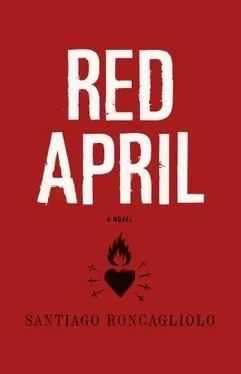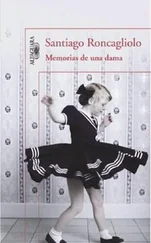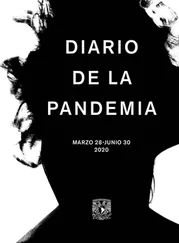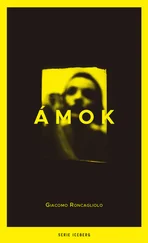“And what did you tell the priest? That we have a serial killer?”
“I did not give him too much information, Señor. Only what was indispensable. He guaranteed his discretion.”
“Discretion! A priest! He must have run to the archbishop's to shout about it there. Priests are like gossiping women. That's why they wear skirts.”
“I think we can trust him, Señor.”
“Trust!” Carrión laughed out loud. “Trust. Do you know why there's a crematorium in the Church of the Heart of Christ?”
“No, Señor.”
“To get rid of inconvenient corpses, Chacaltana. It was a good logistical alternative. Fire instead of graves. They offered to implement it themselves. But the solution itself turned out to be inconvenient. It was too visible, all that smoke in the center of the city. Besides, it meant opening a direct window for the priests onto our confidential operations. As it turned out, we hardly ever used the oven, and when we did, we knew that everybody up to the pope knew about it. You can't trust them. If they offered to install it, it was only to spy.”
“They offered … themselves?”
“It sounded reasonable. We all had the same desire to rid ourselves of the terrorists, didn't we?”
The prosecutor considered it reasonable. But, in any event, he believed in Father Quiroz. He had proven to be very cooperative. Besides, the prosecutor had to believe in somebody. If everything is a lie, he thought, then nothing is. If one lives in a world of falsehoods, those falsehoods are reality. Quiroz spoke of eternal life as a life more real. For a moment, the prosecutor thought he understood what he was referring to. The commander leaned back in his chair. He looked annoyed.
“And you, Chacaltana?” he asked. “Can we trust you?”
Chacaltana wanted to say no, they should not trust him.
“Of course you can, Señor.”
The commander was wearing the shirt and trousers of his uniform, but he looked untidy. His shoes and decorations had not been polished. On his lean face the first signs of a thin beard were making their appearance, more like dirt stains than facial hair.
“They're coming for me, Chacaltana. I know it. I can feel it. Every second we spend here is an opportunity for our killers.”
“They will not come for you, Señor. That is why we are here: so that will not happen.”
The commander flashed a brief smile of thanks. Then his face darkened:
“They'll come in any case,” he said sorrowfully. “Death forces its way in. I know that all too well.”
At times, Prosecutor Chacaltana realized in a flash that he was carrying out an investigation under orders from a killer. At times he wondered if it was possible to avoid that anywhere in his city or in any other city. But those thoughts always disappeared from his mind by themselves, so he would not be distracted from his duties.
“Perhaps you're right,” the commander concluded. “Perhaps this has to do with Holy Week. But not the way you think. You're a strange guy, Chacaltana. You're always about to hit the bull's eye and you always miss.”
“Thank you, Señor,” said the prosecutor. He wondered if he should have said that.
“They're trying to spoil the celebration. The symbol of Ayacucho, the pacified city. The record tourism of Holy Week. They're trying to show that they're back all over the uplands. And in the middle of the millennium, for fuck's sake. A blow struck for effect. Lucky we managed to hide it from the press. Being in the news would excite them. They don't have many resources yet, but they've become more sophisticated. These kinds of things didn't occur to them before.”
“In that case, it is possible to predict that their next blow will be tomorrow. Palm Sunday. The official beginning of Holy Week.”
“The triumphal entrance of Christ into Ayacucho.”
“Exactly, Señor.”
Commander Carrión thought for a few seconds. Then he called his secretary on the intercom and turned toward the prosecutor.
“They're going to think I'm crazy, but what the hell. I'll cancel all leaves for the police and request military reinforcements. I'll have them patrol the entire city, armed but in civilian clothes, so as not to cause any alarm. And I'll invent something to justify it internally. You can go, Chacaltana. And thank you.”
The prosecutor stood up. The commander thought of something else:
“Are you carrying your weapon?”
“What? Excuse me?”
“Where's the pistol I gave you? You're not carrying it? Carry it, don't be an asshole! You're a possible victim too. Very possible.”
“Yes, Señor.”
The prosecutor left headquarters thinking about the commander's final words. He had not been aware that he too was a possible victim. It was difficult for him to get used to the idea of being an official important enough to be annihilated. Annihilated, he repeated to himself. Turned into nothing. He thought it was a horrible word. He went to his office and opened the drawer. He took out the pistol carefully, verifying one more time that the safety was on. He contemplated it on the desk and then he raised it in front of the bathroom mirror. He tried to imagine himself shooting. He could not. He put it in the sheath and placed it in a large manila envelope. It was too big, and the envelope did not conceal it. He placed the envelope inside the typewriter cover. He went out carrying it as if it were a baby. He walked quickly to his house, nervously bumping into groups of tourists and vendors, afraid the gun would go off in spite of the safety because the devil carries weapons. When he was home, he took the package to his mother's room and put it on the bureau.
“Don't worry, Mamacita, I'm not going to open it, don't be afraid. It's just so you'll know I've brought it here. I think … I think the best thing is to keep it in the night table, just in case, though nothing's going to happen. Because nothing's going to happen, right? Nothing's going to happen.”
He continued repeating those words without taking his eyes off the weapon for at least two hours, until someone rang the doorbell. Before he opened the door, he hid the package in his night table. He was not convinced. He took it out and put it under the bed. Not that either. The doorbell kept ringing. Nervously, he left it behind the barrel of water he used when the water supply was cut. Yes. Nobody would look for it there. Before he opened the door, he took the pistol out again and returned it to the night table. He hurried to the door. It was Edith.
“They gave me the day off because tomorrow I work all day,” she said.
They spent the afternoon walking through a city they did not recognize, one filled with blond people with an accent from the capital. A couple of drunk Limenians whistled at Edith when she walked by. The prosecutor shouted at them:
“Beat it, motherfuckers!”
Edith laughed, but when they sat down to eat at a chicken shop, she said:
“You're nervous. What's the matter?”
“Things at work. Nothing important.”
“You were at Heart of Christ today, weren't you? They saw you with Father Quiroz.”
“Who saw me?” The prosecutor could not repress a touch of distress in his voice.
“I don't know. People. Ayacucho is a very small town, everybody knows everything. Why?” She gave him a mischievous smile. “Was it a secret?”
“No, no. It's just that … I'm working on a difficult case.”
“That's what happens when they promote you, isn't it? They give you more responsibility.”
“Yes, that's true. Did they see me anywhere else?”
“I don't know. I only heard that. Can't you tell me what your case is?”
“It would be better if you didn't know. It would be better for me not to know.”
“That priest is a good person. I go to that church a lot. He's very nice.”
Читать дальше












